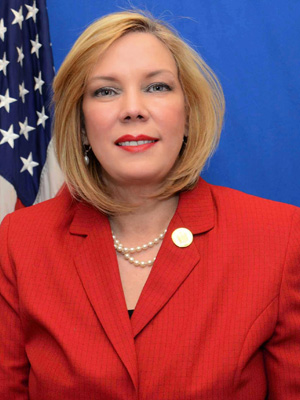2017-10
Ending Veteran Homelessness

SENATOR NILSA CRUZ-PEREZ, CHAIR (NJ) VETERANS AFFAIRS TASK FORCE
WHEREAS, recent data shows that, on average, there are 564,708 people experiencing homelessness in the United States, meaning they were sleeping on the streets, in cars, or in a homeless shelter or transitional housing program ; and
WHEREAS, in January 2014, communities across America identified 49,933 homeless veterans during point-in-time counts, which represent 8.6 percent of the total homeless population; and
WHEREAS, American veterans are more likely than civilians to experience homelessness, in part because they have a higher risk of experiencing traumatic brain injuries and Post-Traumatic Stress Disorder (PTSD), both of which have been found to be among the most substantial risk factors for homelessness; and
WHEREAS, roughly 45 percent of all homeless veterans are African American or Hispanic, despite only accounting for 11.2 percent and 6.6 percent of the U.S. veteran population, respectively ; and
WHEREAS, the Department of Veterans Affairs, using its own resources or in partnership with others, has secured nearly 15,000 residential rehabilitative and transitional beds and more than 30,000 permanent beds for homeless veterans throughout the nation.
WHEREAS, American veterans could benefit from integrated services that provide secure housing, nutritional meals, basic physical health care, substance abuse care and aftercare, mental health counseling, personal development and empowerment;
WHEREAS, The United States Interagency Council on Homelessness (USICH) presented the report titled “10-Strategies to End Veterans Homelessness”; the ten recommended strategies are: (1) get state and local leaders to publicly commit to and coordinate efforts on ending veteran homelessness, (2) implement a housing first system orientation and response, (3) implement a coordinated entry system, (4) set and meet ambitious short and long-term goals by deploying all resources effectively, (5) improve transitional housing performance and consider adopting different models and/or converting or reallocating resources into supportive housing, (6) engage and support private landlords as partners, (7) identify and be accountable to all veterans experiencing homelessness, (8) Conduct coordinated outreach and engagement efforts, (9) increase connections to employment, (10) coordinate with legal services organizations to solve legal needs; and
BE IT RESOLVED, that the NHCSL believes that ending veteran homelessness is possible; and that public support from our state and local leaders is essential to securing and aligning the resources and partners needed to end veteran homelessness in our community.
BE IT FINALLY RESOLVED that the NHCSL encourages policymakers to raise awareness about the American veterans’ homelessness, specifically amongst the Latino and minorities communities; and NHCSL highly encourages legislators to study and adopt the 10-Strategies to End Veterans Homelessness established United States Interagency Council on Homelessness (USICH), in conjunction with local strategies.
THIS RESOLUTION WAS ADOPTED ON APRIL 30, 2017, AT THE NHCSL EXECUTIVE COMMITTEE MEETING HELD IN WASHINGTON, DC.
1. http://www.endhomelessness.org/library/entry/SOH2016
2. https://www.va.gov/vetdata/docs/SpecialReports/Minority_Veterans_2014.pdf
